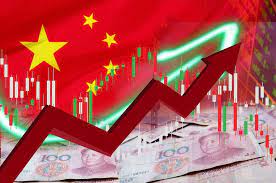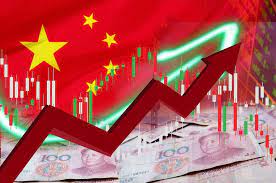
Analysts noted that China's $18.6 trillion economy has avoided several short-term negative risks that were indicated by recent indications, giving officials more time to persuade investors that they can ignite a new growth engine for 2024 and the years to come.
Economic data from January to February and a survey of factory owners for March provided solace to Chinese policymakers who were trying to persuade foreign investors that they could revive the world's second-largest economy, which had failed to show signs of sustained growth after Beijing abandoned strict COVID curbs in late 2022.
Though things might not be getting worse, experts and investors remain concerned, believing that the market, which was once seen to be the driving force behind global economy, could eventually stop later in the year unless policymakers can find out how to get it to fire on all cylinders again.
China has adopted a number of measures to stimulate its economy, such as lowering the amount banks must have in reserve and encouraging banks to lend more to high-end manufacturing rather than real estate, but they stated that these policy measures are losing their effectiveness and may potentially be reduced.
"China is pushing to have a normal 2024. They know they can still export, and they know that if they push this year, they can buy themselves time," said Alicia Garcia Herrero, chief economist for the Asia Pacific at Natixis, .
"But China cannot grow more than last year, and it never will, as the fiscal cost of growing more than it did in 2023 is so huge," she added. "China's growth model is not sustainable."
On Thursday, the S&P 500 recorded its best first-quarter gain in five years, even though U.S. stocks ended the day mostly unchanged.
Together with stronger-than-expected exports and consumer inflation indicators, China's factory output and retail sales exceeded estimates in January and February, giving Beijing a head start on its aspirations to meet the 5.0% GDP growth target that analysts have dubbed ambitious for 2024.
Citi increased its economic growth prediction for China to 5.0% this year from 4.6% on Thursday, citing "recent positive data and policy delivery".
At an international investment meeting held in Beijing last week, International Monetary Fund Managing Director Kristalina Georgieva stated that China "faces a fork in the road" and that it must "reinvent itself for a new era of high-quality growth."
The IMF raised its prediction by 0.4 percentage points to 4.6% in January, citing more government spending. However, this increase is still less than the 5.2% growth that was actually seen last year.
Chinese President Xi Jinping coined the term "New Productive Forces" in September to emphasise the need for economic development based on innovation in advanced areas. This term is being relied upon by officials.
Analysts continue to doubt China's ability to both maintain development and reform its economy simultaneously.
"China is barely keeping up with a growth rate that is decelerating, so (the data) is not 'green shoots'," Garcia Herrero said.
"5.2% is not the bottom, it's the top," she added.
Due to a struggling real estate market, constrained consumer spending, a declining trade surplus, and strained local government budgets, Rhodium Group projects that real growth in 2023 will be closer to 1.5% than the official government forecast.
Looking ahead, the New York-based research company, well-known for its coverage of China, said in December that China may see a cyclical recovery to maybe 3.0-3.5% GDP in 2024.
Officials are optimistic that China will meet its annual growth target of about 5%.
However, investors are more interested in knowing how Beijing intends to promote domestic demand to deter Washington and Brussels, which are both considering taking action against Chinese exports, than they are in learning more about the government's intentions to limit the damage a protracted debt crisis in the real estate sector is exacting on growth.
"China is off the map. And that's something that they've barely started to grapple with," said Rogier Creemers, an assistant professor of Chinese studies at Leiden University.
The current uptick in the data was supported by the government's money injection into the economy and the Lunar New Year, which fell in February of this year, which gave consumer pricing and retail sales figures a boost. Analysts warn officials that time is running out to develop a new growth model.
Zichun Huang, a Capital Economics China Economist, stated in a note that "growth should continue to do reasonably well in the near term given the near-term tailwinds from stimulus." "But once policy support is scaled back, probably later this year, structural headwinds mean the economy is likely to slow again."
China's real estate industry, which formerly made up 25% of the country's GDP, is especially prominent.
Despite government efforts to curb a prolonged downturn in the real estate sector, property investment and sales declined more slowly in the first two months of the year. Nevertheless, economists remain concerned that this could be the downfall of the economy.
In order to prevent the economy from going completely bust, officials are currently essentially fighting fires, according to Frederic Neumann, chief Asia economist at HSBC in Hong Kong.
"But there's the longer-term question of what will drive growth in the future, once the property sector subsides."
(Source:www.theglobeandmail.com)
Economic data from January to February and a survey of factory owners for March provided solace to Chinese policymakers who were trying to persuade foreign investors that they could revive the world's second-largest economy, which had failed to show signs of sustained growth after Beijing abandoned strict COVID curbs in late 2022.
Though things might not be getting worse, experts and investors remain concerned, believing that the market, which was once seen to be the driving force behind global economy, could eventually stop later in the year unless policymakers can find out how to get it to fire on all cylinders again.
China has adopted a number of measures to stimulate its economy, such as lowering the amount banks must have in reserve and encouraging banks to lend more to high-end manufacturing rather than real estate, but they stated that these policy measures are losing their effectiveness and may potentially be reduced.
"China is pushing to have a normal 2024. They know they can still export, and they know that if they push this year, they can buy themselves time," said Alicia Garcia Herrero, chief economist for the Asia Pacific at Natixis, .
"But China cannot grow more than last year, and it never will, as the fiscal cost of growing more than it did in 2023 is so huge," she added. "China's growth model is not sustainable."
On Thursday, the S&P 500 recorded its best first-quarter gain in five years, even though U.S. stocks ended the day mostly unchanged.
Together with stronger-than-expected exports and consumer inflation indicators, China's factory output and retail sales exceeded estimates in January and February, giving Beijing a head start on its aspirations to meet the 5.0% GDP growth target that analysts have dubbed ambitious for 2024.
Citi increased its economic growth prediction for China to 5.0% this year from 4.6% on Thursday, citing "recent positive data and policy delivery".
At an international investment meeting held in Beijing last week, International Monetary Fund Managing Director Kristalina Georgieva stated that China "faces a fork in the road" and that it must "reinvent itself for a new era of high-quality growth."
The IMF raised its prediction by 0.4 percentage points to 4.6% in January, citing more government spending. However, this increase is still less than the 5.2% growth that was actually seen last year.
Chinese President Xi Jinping coined the term "New Productive Forces" in September to emphasise the need for economic development based on innovation in advanced areas. This term is being relied upon by officials.
Analysts continue to doubt China's ability to both maintain development and reform its economy simultaneously.
"China is barely keeping up with a growth rate that is decelerating, so (the data) is not 'green shoots'," Garcia Herrero said.
"5.2% is not the bottom, it's the top," she added.
Due to a struggling real estate market, constrained consumer spending, a declining trade surplus, and strained local government budgets, Rhodium Group projects that real growth in 2023 will be closer to 1.5% than the official government forecast.
Looking ahead, the New York-based research company, well-known for its coverage of China, said in December that China may see a cyclical recovery to maybe 3.0-3.5% GDP in 2024.
Officials are optimistic that China will meet its annual growth target of about 5%.
However, investors are more interested in knowing how Beijing intends to promote domestic demand to deter Washington and Brussels, which are both considering taking action against Chinese exports, than they are in learning more about the government's intentions to limit the damage a protracted debt crisis in the real estate sector is exacting on growth.
"China is off the map. And that's something that they've barely started to grapple with," said Rogier Creemers, an assistant professor of Chinese studies at Leiden University.
The current uptick in the data was supported by the government's money injection into the economy and the Lunar New Year, which fell in February of this year, which gave consumer pricing and retail sales figures a boost. Analysts warn officials that time is running out to develop a new growth model.
Zichun Huang, a Capital Economics China Economist, stated in a note that "growth should continue to do reasonably well in the near term given the near-term tailwinds from stimulus." "But once policy support is scaled back, probably later this year, structural headwinds mean the economy is likely to slow again."
China's real estate industry, which formerly made up 25% of the country's GDP, is especially prominent.
Despite government efforts to curb a prolonged downturn in the real estate sector, property investment and sales declined more slowly in the first two months of the year. Nevertheless, economists remain concerned that this could be the downfall of the economy.
In order to prevent the economy from going completely bust, officials are currently essentially fighting fires, according to Frederic Neumann, chief Asia economist at HSBC in Hong Kong.
"But there's the longer-term question of what will drive growth in the future, once the property sector subsides."
(Source:www.theglobeandmail.com)





